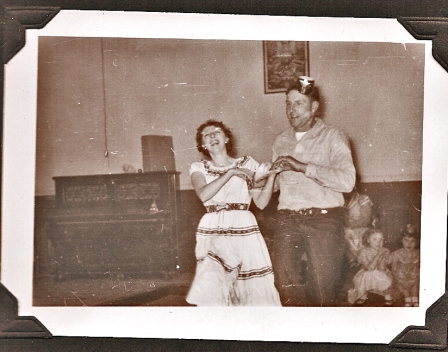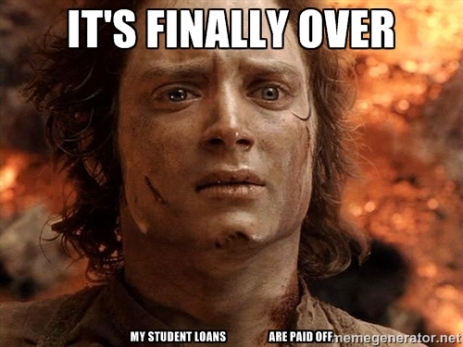
I was sad to hear that writer Ursula K. LeGuin died last night. I got to meet her once, when she was GoH at a conference of the Mythopoeic Society, and found her to be as stunningly present and wise in person as on the page. Plus I was moved beyond words when she chose a piece of my art for the “Author’s Choice” award. But that was just a mild fangirl moment: her influence on me was much longer and stranger.
We rarely get the chance to know and understand the influences we have had on the lives of others. You know? “That changed my life,” someone says, referring to some random statement or deed that you may barely even register or recall. Yet it turns out to have had a profound impact on them. This is just such a story.
When I was in high school, I had the tremendous blessing to have gotten Joanne Burnett (also fondly known as “Burnie”) as my teacher for sophomore English.
She had also founded the Tolkien Society, a haven for the brilliant weirdos who otherwise would likely have no home in high school society at all and may even have dropped out. Honor students who loved science fiction and fantasy: the skinny smart boys who knew every word to Monty Python’s routines; the musical genius girl who was put two years ahead and so was emotionally worlds away from most of her peers; and me with my untimely wild curly hair and braces on my teeth, a flowery vocabulary, and a noxious only-child combo of shy insecure artist with poor group social skills plus the costumed ego that attends a love of theater. She took us all in and gave us not only alternate worlds to inhabit, but a real-life community to go there with in a creative way that had us all laughing and reveling in our weirdness instead of drowning in it and then squelching it for survival. We built a dragon float for Homecoming, complete with steam that shot out in the general direction of the football team.

One day, Burnie was teaching LeGuin’s short story, “The Ones Who Walk Away from Omelas.” It’s a story about ethics. It teaches insecure kids about the need to care about others. What greater lesson could there be? It made many of us into activists. That story, combined with Burnie’s political letter-writing assignment, made me feel politically empowered for the first time: able to contribute to making large change instead of just being a helpless victim of circumstance.
This story, Omelas, moves her. She had taught it dozens of times already, but every time, she told me later, she had cried. This was no different. She got to the end, and not only teared up, she struggled to control her tears so much that she could not keep reading. Her head was down as she held the book loosely in her left hand and tried not to sob.
You know kids. Adolescents struggle with their own turbulent emotions, so a teacher openly showing hers like that? Awkward. The class sat there semi-frozen, looking at her fixedly or darting glances at one another out of the corners of our eyes. Waiting for Ms. Burnett to pull it back together, the silence in the room grew uncomfortable. Too uncomfortable.
I know what it is like to feel strong emotions when it’s socially unacceptable, and the desperate futility of trying not to cry. In fifth and sixth grades, the world got to me and I cried every day from a feeling of impotent agony. It began in math class, where the cruelty from Dean, the blond freckled kid in the desk next to mine, was strongest. Turning the pain inward like so many girls do instead of outward like Dean was doing, I began to physically hurt myself every day. In a visible way, which of course made things far worse. And after awhile, I couldn’t stop. (But that’s another story, perhaps for another time, if there’s a chance it can help someone now.)
My unwanted tears welled up other times too, when feeling helpless fury over other kids’ meanness, especially in groups; or at home, when considering the “duck and cover” training we were told would save us from nuclear attack, even though I couldn’t for the life of me figure out how cowering under a tiny school desk for awhile could help much.
This duck-and-cover practice meant repeatedly confronting its inherent idea that we might never get to grow up. That we were all at the mercy of powerful men at the helm of our countries; men who might be, or get, mad enough to push that button.
I understood that possibility as real, due to repeatedly experiencing Dean’s casual meanness. And when you look at the world that way, why would anything matter? Since we might never get to have a grownup life or career anyway, why not just read comic books and climb trees while you can? Why not savagely poke each other to the point of blood with your compass’ steel point in geometry class when nobody is looking? Why not just do anything you want while you can, and damn the rest of the world?
Burnie’s lessons about social justice finally gave me a reason why. I mean one beyond the heart, which knew all along and had been crying for that; she offered a reason that I could articulate in order to then reason with others. So I thought her tears for injustice unspeakably beautiful. She dared to face the situation, which is the first stage of changing it. She faced it with not only her mind, but also with full, brave heart and spirit. And she was teaching us how, too.
I didn’t want her to be put down for her open sensitivity like I had been.
So when the feeling in the room began to grow too uncomfortable, I got up from my seat and walked to the front of the room, where I gently took the paperback book from her hands. Finding the last line she had read, I read it aloud again to orient everyone and then kept going with the story from there, reading it aloud for the class until the end. I then closed the book, quietly placed it near her on her table, and returned to my seat.
Ms. Burnett looked up through her tears and smiled a thank-you. In a few moments, after blowing her nose, she pulled herself together enough to lead a moving discussion about the story and its lessons regarding what is truly important; about to best live as a full human being. Lessons that few high school teachers dare to touch, let alone from a place of deep personal authenticity. Deep, vital questions that can impact a student for life.
The only reason I remember this story is that Burnie told it again numerous times over the years. How my kindness at age 14, in the face of widespread potential disapproval from my peers, had moved her. How that act had demonstrated, in a small way, the principles the story was trying to teach.
Because of that story, I caught Burnie’s attention and eventually we became dear friends. This friendship lasted more than forty years, until her death a few months ago, and was one of the greatest blessings of my entire life. In my later teens and early 20s, it brought me a whole larger community of kind nerds, with whom I still remain emotionally close even though I now live in a different state. Burnie’s people-gathering skills spawned our own local chapter of the Mythopoeic Society as well as the first northern Nevada chapter of the Society for Creative Anachronism. She saved the brilliant weirdos like me, and I in particular have LeGuin, in part, to thank for it.
Now I teach the “Omelas” story too, but to Ecopsychology M.A. students. It opens doors to discuss the needs and wants of the individual vs. collective, and the hard question of whether we have an ethical responsibility to take action when need is seen, especially when it seems futile in a practical sense. The outer and inner ramifications of each choice (to act or not) make for juicy discussion. I now get to honor and encourage in my own students, as Burnie put so fabulously, “the moral courage to give a damn.”

Ursula K. LeGuin loved Taoism, as do I, and her themes often speak of the balance inherent in that philosophy (and in ecological reality). I’ll end this with my favorite poetic lines from the first book of hers that Burnie gave me at age 14 or 15. I still call upon it in times of need. May it serve you in turn.
*
The Creation of Éa
Only in silence the word,
only in dark the light
only in dying, life:
bright the hawk’s flight
on the empty sky.
— Ursula K. LeGuin, epigraph in A Wizard of Earthsea
*
Farewell to two bright spirits that have enhanced this world by their embodied sojourns here. (I can imagine the “Hereafter Speculative Fiction Book Club” that’s forming in Taoist heaven as you read this. Maybe discussing books that haven’t yet been written? Maybe offering useful suggestions to their future authors? We writers can hope…)
Further Resources:
- Click to read Ursula K. LeGuin’s full obituary in the New York Times
- “The Ones Who Walk Away from Omelas” is a short story published in The Wind’s Twelve Quarters. Right now, you can read it as a PDF here. But please do yourself and her family a favor and go buy the book too. Or another one by her.
My personal favorite by LeGuin is actually Buffalo Gals and Other Animal Presences. What is yours?
——————————————————————-
Collared Sparrowhawk image courtesy of Wikimedia Commons. Image of Ursula K. LeGuin sourced from http://www.orderofbooks.com. Image of Joanne Burnett was made around 1980 by unknown source, perhaps the Wooster High School (Reno, NV) yearbook.

















